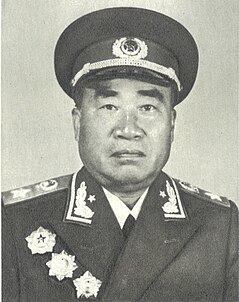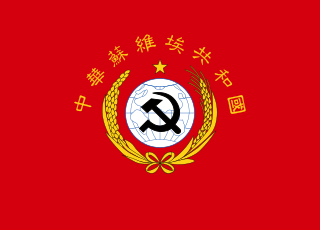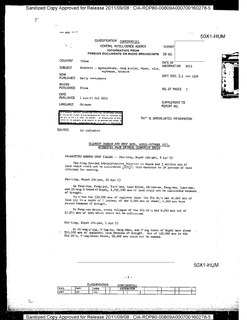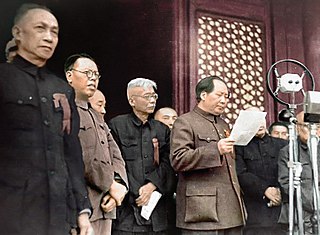
Zhu De was a Chinese general, military strategist, politician and revolutionary in the Chinese Communist Party. Born into poverty in 1886 in Sichuan, he was adopted by a wealthy uncle at age nine. His uncle provided him with a superior early education that led to his admission into a military academy. After graduating, he joined a rebel army and became a warlord. It was after this period that he adopted communism. Joining the Chinese Communist Party, he ascended through the ranks of the Chinese Red Army as it closed in on securing the nation in the Chinese Civil War. By the time China was under Mao's control, Zhu was a high-ranking official within the party. He served as commander-in-chief of the Eighth Route Army during the Second Sino-Japanese War. In 1955, he became one of the ten marshals of the People's Liberation Army, of which he is regarded as one of the principal founders. Zhu remained a prominent political figure until his death in 1976. As the chairman of the Standing Committee of the National People's Congress from 1975 to 1976, Zhu was the head of state of the People's Republic of China.

Jiangxi or Kiangsi, officially the Chinese Soviet Republic (CSR) was an East Asian unrecognized proto-state within the territory of China's Jiangxi (Kiangsi) province and the predecessor to the People's Republic of China. The state was proclaimed on 7 November 1931 by future Chinese Communist Party leader Mao Zedong and General Zhu De in the early stages of the Chinese Civil War.

Zeng Qinghong is a retired Chinese politician. He was a member of the Politburo Standing Committee of the Chinese Communist Party, China's highest leadership council, and top-ranked member of the Secretariat of the Central Committee between 2002 and 2007. He also served as the Vice-President of the People's Republic of China from 2003 to 2008.

The Central Secretariat of the Chinese Communist Party, officially the Central Secretariat of the Communist Party of China, is a body serving the Politburo of the Chinese Communist Party and its Standing Committee. The secretariat is mainly responsible for carrying out routine operations of the Politburo and the coordination of organizations and stakeholders to achieve tasks as set out by the Politburo. It is empowered by the Politburo to make routine day-to-day decisions on issues of concern in accordance to the decisions of the Politburo, but it must consult the Politburo on substantive matters.
Wu Guanzheng is a former Chinese politician and one of the major leaders of the Chinese Communist Party during the administration of Hu Jintao. He served on the Politburo Standing Committee, the country's top ruling body, from 2002 to 2007. During that time he also served as the Secretary of the Central Commission for Discipline Inspection of the Chinese Communist Party, the party's anti-graft body. He had a lengthy political career, having served as mayor of Wuhan, Governor then Party Secretary of Jiangxi, then party chief of Shandong. Wu retired in 2007 and left public life.
Since both the Chinese Communist Party (CCP) and the People's Liberation Army (PLA) promote according to seniority, it is possible to discern distinct generations of Chinese leadership. In official discourse, each group of leadership is identified with a distinct extension of the ideology of the party. Historians have studied various periods in the development of the government of the People's Republic of China by reference to these "generations".

Wang Dongxing was a Chinese military commander and politician, famous for being the chief of Mao Zedong's personal bodyguard force, the 9th Bureau of the Ministry of Public Security. Wang held many important positions, both in the Chinese Communist Party (CCP) and the government; he was Deputy Minister of Public Security in 1955–1958 and again in 1960–1970 and notably served as CCP Vice Chairman from 1977 to 1980, under Chairman Hua Guofeng.

Mao Anqing was the last surviving son of Mao Zedong, chairman of the People's Republic of China. He was the second son of Mao and his wife, Yang Kaihui. He suffered from a mental illness, possibly schizophrenia. He worked as a translator and never became active in politics.

Tao Zhiyue was a Chinese military officer and politician, lieutenant general of the National Revolutionary Army of the Republic of China, and a full general of the People's Liberation Army of the People's Republic of China.

The Central Party School of the Chinese Communist Party, also known as the Central Party School, located in Beijing, is the higher education institution which specifically trains cadres of the Chinese Communist Party (CCP). As of 2012, it has around 1,600 students. The current president is Chen Xi, a member of the CCP Politburo. The location of the school is now in Haidian district, Beijing close to the Old Summer Palace and Summer Palace.
The 15th Politburo of the Chinese Communist Party was elected by the 15th Central Committee of the Chinese Communist Party on September 19, 1997. It was preceded by the 14th Politburo of the Chinese Communist Party. It served until 2002.
The 8th Central Committee of the Chinese Communist Party was in session from 1956 to 1969. It was preceded by the 7th Central Committee of the Chinese Communist Party. It held 12 plenary sessions in this period of 13 years. It was the longest serving central committee ever held by the Communist Party.
The 7th Central Committee of the Chinese Communist Party was in session from 1945 to 1956. It was a product of the convening of the 7th National Congress of the Chinese Communist Party. It held six plenary sessions in this 11-year period. It began in June 1945, before the end of the Second Sino-Japanese War, and the resumption of the Chinese Civil War. This committee would be succeeded by the 8th Central Committee.

Zeng Shan was a Chinese Communist military commander and security minister. His wife, Deng Liujin, was one of the few women who participated in the Long March, and later ran a school for the children of high cadres. He was the father of Zeng Qinghong, Vice President of the People’s Republic of China from 2003 to 2008.
Events in the year 1950 in the People's Republic of China.

Events in the year 1953 in the People's Republic of China.

Li Fuchun was a Chinese Communist revolutionary and politician. He served as a Vice Premier of the People's Republic of China.

Communist-controlled China or the Revolutionary Base Area of the Communist Party of China, officially called the Soviet Zone from 1927 to 1937, and the Liberated Zone from 1946 to 1949, was the part of the territories of China controlled by the Chinese Communist Party (CCP) from 1927 to 1949 during the Republican era and the Chinese Civil War with Nationalist China.
Zeng Qinghong is a Chinese politician from Jiangxi province, serving since 2013 as the Head of the Organization Department of Chongqing. In the past, she had served as the mayor of Jiujiang, and the vice governor of Jiangxi.

The founding of the People's Republic of China was formally proclaimed by Mao Zedong, the Chairman of the Chinese Communist Party (CCP), on October 1, 1949 at 3:00 pm in Tiananmen Square in Peking, now Beijing, the new capital of China. The formation of the Central People's Government under the leadership of the CCP, the government of the new state, was officially proclaimed during the proclamation speech by the chairman at the founding ceremony.











